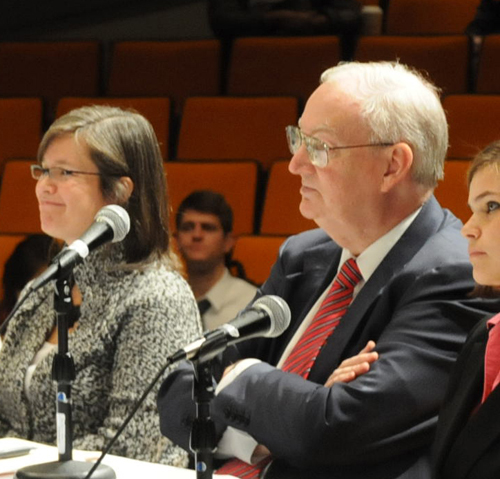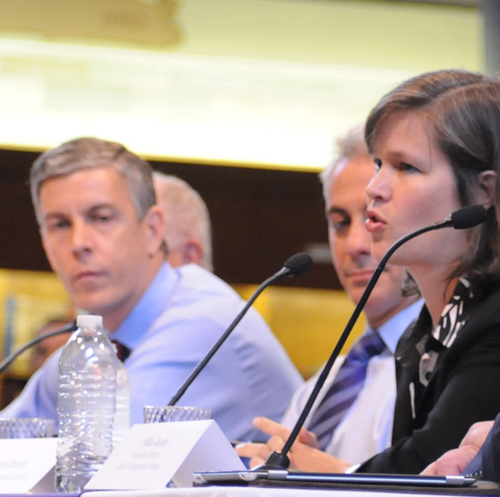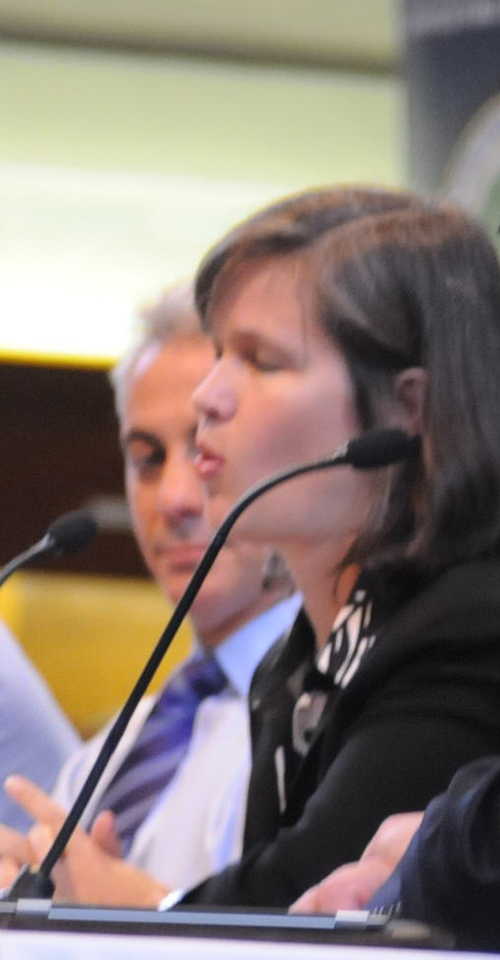Merit Pay has failed, so Chicago's mayor orders merit pay for all principals
Merit Pay (currently called "performance pay") has failed in every complex human activity from the War in Vietnam (where the "Body Count" perverted soldiering into slaughter) to Wall Street (where the quarter-to-quarter short-term evaluations of executives created not only the monstrous executive pay plans, but also drove thousands of corporations and billions of dollars in wealth into oblivion), so naturally it's going to be utilized in education, with a major emphasis on Chicago's public schools. There, in Chicago, bad idea are birthed and morph into the Frankensteins now roaming the land, from Charter School Salvation stories to "Race To The Top" (and school "turnarounds" for those at the "bottom").
 With the backing of millionaires and billionaires, Robin Steans (above right) and her group, "Advance Illinois," has been promoting merit pay for teachers and principals, despite her ignominious career as a classroom teacher (Sullivan High School Chicago) — and the complete lack of evidence that the stuff works. Above, Steans, a millionaire heiress, was a featured speaker at Chicago's Schurz High School on September 9, 2011, when U.S. Secretary of Education Arne Duncan came to town during his school bus tour of the U.S. Midwest. Duncan and the Obama administration have been pushing merit pay for teachers and principals as part of the federal government's "Race To The Top" privatization plan for public schools. Above, Chicago Mayor Rahm Emanuel, who was paid $18 million during three years' work in the private sector as a "relationship banker", is a major supporter of merit pay in the public sector. Emanuel at the time the above photograph was taken had been admiring Substance's reporting on his regime. Substance photo by George N. Schmidt.Although the State of Illinois is finding it impossible to establish valid, reliable and fair ways of instituting "performance pay" for teachers, despite the claims of billionaire groups from the Civic Committee and Advance Illinois to the now infamous "Stand for Children", Chicago Mayor Rahm Emanuel has edicted that Chicago public school principals will henceforth be on a merit pay plan. At a November 9, 2011 media event at the Chicago High School for Agricultural Sciences, Emanuel staged his merit pay introduction for principals, amid the usual fanfare and to the usual uncritical corporate Chicago press corps.
With the backing of millionaires and billionaires, Robin Steans (above right) and her group, "Advance Illinois," has been promoting merit pay for teachers and principals, despite her ignominious career as a classroom teacher (Sullivan High School Chicago) — and the complete lack of evidence that the stuff works. Above, Steans, a millionaire heiress, was a featured speaker at Chicago's Schurz High School on September 9, 2011, when U.S. Secretary of Education Arne Duncan came to town during his school bus tour of the U.S. Midwest. Duncan and the Obama administration have been pushing merit pay for teachers and principals as part of the federal government's "Race To The Top" privatization plan for public schools. Above, Chicago Mayor Rahm Emanuel, who was paid $18 million during three years' work in the private sector as a "relationship banker", is a major supporter of merit pay in the public sector. Emanuel at the time the above photograph was taken had been admiring Substance's reporting on his regime. Substance photo by George N. Schmidt.Although the State of Illinois is finding it impossible to establish valid, reliable and fair ways of instituting "performance pay" for teachers, despite the claims of billionaire groups from the Civic Committee and Advance Illinois to the now infamous "Stand for Children", Chicago Mayor Rahm Emanuel has edicted that Chicago public school principals will henceforth be on a merit pay plan. At a November 9, 2011 media event at the Chicago High School for Agricultural Sciences, Emanuel staged his merit pay introduction for principals, amid the usual fanfare and to the usual uncritical corporate Chicago press corps.
The official City of Chicago press release follows here. As of November 10, 2011, there had been no word on the plan from the Chicago Board of Education, which meets next Wednesday (November 16, 2011):
FOR IMMEDIATE RELEASE, November 9, 2011, CONTACT: Mayor’s Press Office (312) 744-3334 press@cityofchicago.org
MAYOR EMANUEL, CPS OFFICIALS ANNOUNCE CRITERIA FOR PRINCIPAL PERFORMANCE DESIGNED TO INCREASE ACCOUNTABILITY AND DRIVE STUDENT ACHIEVEMENT
Mayor Rahm Emanuel joined CPS officials today at a meeting for CPS Network Chiefs to announce new performance metrics the district has implemented to enhance accountability among principals and school leaders, with the goal of boosting student achievement district-wide.
“I’ve made it clear that one of my top priorities is that every child in this city has access to a world- class education, so that they can compete and win in a global economy,” said Mayor Emanuel. “We need empowered principals, quality teachers and involved parents, and all must be accountable for our students’ success. “
Principals of both charter and traditional CPS schools will be measured based on performance in four key areas compared to the performance of similar schools or similar student groups during the 2011-2012 school year. The criteria allows for principals of low-performing schools to be recognized for making significant changes to how students are learning within their schools and how quickly they are catching up to critical academic benchmarks.
 During the big push for a plan called "Performance Counts," Robin Steans (left) of the astroturf group called "Advance Illinois" and R. Eden Martin (right) of the Civic Committee of the Commercial Clubs of Chicago testified on behalf of merit pay during the hearings by the Illinois House special committee on school reform. The merit pay plan had already been put in place by the PERA legislation a year earlier, but has stalled because a growing body of evidence shows it never worked and can never worked in a complex human system like public schools. The support of groups like Advance Illinois and the Civic Committee, both of which represent the "one percent", keeps the claims of merit pay alive in Illinois, no matter how ridiculous the claims. Substance photo by George N. Schmidt.Elementary school principals will be evaluated based on growth in reading and math, improvement in college readiness and their effectiveness in closing the achievement gap.
During the big push for a plan called "Performance Counts," Robin Steans (left) of the astroturf group called "Advance Illinois" and R. Eden Martin (right) of the Civic Committee of the Commercial Clubs of Chicago testified on behalf of merit pay during the hearings by the Illinois House special committee on school reform. The merit pay plan had already been put in place by the PERA legislation a year earlier, but has stalled because a growing body of evidence shows it never worked and can never worked in a complex human system like public schools. The support of groups like Advance Illinois and the Civic Committee, both of which represent the "one percent", keeps the claims of merit pay alive in Illinois, no matter how ridiculous the claims. Substance photo by George N. Schmidt.Elementary school principals will be evaluated based on growth in reading and math, improvement in college readiness and their effectiveness in closing the achievement gap.
For high schools, principals will be evaluated based on growth in ninth grade achievement with an emphasis on measuring students’ ability to meet college readiness benchmarks in reading and math, 10th and 11th grade academic growth, improvement toward graduating students by lowering dropout rates, and ability to make strides in closing the achievement gap.
“Principals set the core vision and values at work in their schools, and their leadership can transform the school community of teachers, parents and students to drive student academic success,” said Noemi Donoso, CPS Chief Education Officer. “The goal is to reward excellence and the contribution principals make in leading our entire district toward graduating every student ready for college and a career.”
In addition, the Mayor announced that the performance of Networks Chiefs, who are responsible for the oversight and collaborative vision of all principals within their elementary or high school networks, will also be measured based on criteria currently under development.
Principals will receive awards of up to $20,000 for leading academic progress in their schools by significantly boosting student academic achievement and driving the district’s mission to graduate every CPS student college ready. The awards are unrelated to the district’s contract with principals and funded through third-party sponsors to support this project.
Although criteria for elementary and high schools varies, comparisons will be made between similar groups of student and similar schools to gauge academic progress relative to their peers and to ensure that principals making great strides are rewarded for increasing student success.
This year, the elementary school criterion includes:
Growth in Reading: Schools must rank in the 75th percentile or above in reading growth (measured by value added on ISAT reading).
Growth in Math: Schools must rank in the 75th percentile or above in math growth (measured by value added on ISAT math).
Improvement in College Readiness: Schools must rank in the 75th percentile or above in the growth of the percent of students meeting college readiness benchmarks on Grade 8 EXPLORE for both reading and math. Or, they must maintain 90% or more of students meeting college readiness benchmarks on Grade 8 EXPLORE for both reading and math.
Closing the Achievement Gap: Schools must rank in the 75th percentile or above in reading and math for more than 50% of the school’s subgroups in the percent of students improving by a performance level or staying at exceeds on ISAT reading and math.
High School criterion for performance includes:
Growth in 9th Grade: Schools must rank in the 95th percentile or above compared to schools with similar incoming scale scores in the change in average scale score growth from EXPLORE to PLAN reading and math.
Growth in 10th and 11th Grade: Schools must rank in the 95th percentile or above compared to schools with similar incoming scale scores in the change in average scale score growth from PLAN to ACT in reading and math.
Improvement toward Graduation: Schools must rank in the 75th percentile or above in the reduction of the one-year dropout rate for grade 9-12 students who had not dropped out in the previous two years. Or maintain a dropout rate for grade 9-12 students who had not dropped out in the previous two years that is less than or equal to 0.5%.
 One of the reasons why states have to scramble to develop undoable merit pay plans is that the U.S. Department of Education, under former Chicago Public Schools Chief Executive Officer Arne Duncan, insists on such plans for state that vied for "Race To The Top" funding. Despite the fact that Illinois didn't get the funding, the Illinois General Assembly passed merit pay (as PERA) in January 2010. Substance photo by George N. Schmidt. Closing the Achievement Gap: Schools must rank in the 75th percentile or above in the change in the average composite ACT scale score OR maintain an ACT score of 21 or above for more than 50% of the school’s subgroups.
One of the reasons why states have to scramble to develop undoable merit pay plans is that the U.S. Department of Education, under former Chicago Public Schools Chief Executive Officer Arne Duncan, insists on such plans for state that vied for "Race To The Top" funding. Despite the fact that Illinois didn't get the funding, the Illinois General Assembly passed merit pay (as PERA) in January 2010. Substance photo by George N. Schmidt. Closing the Achievement Gap: Schools must rank in the 75th percentile or above in the change in the average composite ACT scale score OR maintain an ACT score of 21 or above for more than 50% of the school’s subgroups.
 Substance's candid camera caught Robin Steans and Rahm Emanuel sharing a moment of joy over SB7 and their appreciation of performance incentives during the Arne Duncan media event at Schurz High School on September 9, 2011. Substance photo by George N. Schmidt.After a review by a steering committee, awards will be offered on a sliding scale based on the number of criteria the principal accomplished within their school. Principals at schools achieving two of the criteria will receive $5,000; principals at schools achieving three of the criteria will receive $10,000; and principals at schools achieving all four of the criteria will receive $20,000. Awards will be distributed in October 2012.
Substance's candid camera caught Robin Steans and Rahm Emanuel sharing a moment of joy over SB7 and their appreciation of performance incentives during the Arne Duncan media event at Schurz High School on September 9, 2011. Substance photo by George N. Schmidt.After a review by a steering committee, awards will be offered on a sliding scale based on the number of criteria the principal accomplished within their school. Principals at schools achieving two of the criteria will receive $5,000; principals at schools achieving three of the criteria will receive $10,000; and principals at schools achieving all four of the criteria will receive $20,000. Awards will be distributed in October 2012.
MEDIA WATCH: The Chicago Sun-Times missed the story. The Chicago Tribune gave it one of the most jargony headlines yet...
CPS lays out metrics for principal bonuses, Boosting student achievement could net as much as $20,000
By Noreen S. Ahmed-Ullah, Chicago Tribune reporter, 7:38 p.m. CST, November 9, 2011
Mayor Rahm Emanuel announced Wednesday the criteria by which high-performing Chicago Public Schools principals will receive up to $20,000 in bonuses for boosting student achievement this school year.
Charter school principals will be eligible too, and the mayor announced that network chiefs — who oversee groupings of elementary schools and high schools — also can receive bonuses for driving significant gains at their schools.
In August, Emanuel announced the pay-for-performance incentives for principals that he had secured through private donors. At the time, the performance metrics by which those bonuses would be doled out were not determined.
On Wednesday, Emanuel said schools will be compared to similar schools so that principals of low-performing schools can still be rewarded for making big strides.
Elementary school principals will earn bonuses if they rank in at least the 75th percentile in reading or math growth when compared with their peers. They must have 90 percent or more of their students meeting college readiness benchmarks in eighth grade or be ranked in the 75th percentile or greater in the number of students meeting those college-ready standards compared with their peers. And they must show significant gains in closing the achievement gap.
At the high school level, principals will receive the bump in pay for showing significant growth for their freshmen, or for their sophomores and juniors, by closing the achievement gap and by ranking in the 75th percentile or greater in reducing the dropout rate.
Principals gain $5,000 for achieving two of the identified goals, $10,000 for attaining three and $20,000 for meeting all four.
"It seems more of a recognition than an incentive," said William Hook, principal of the Chicago High School for Agricultural Sciences, where the announcement was made. "The intent of this is not to change the behavior of principals but to recognize good ones and, hopefully, others can also learn from them."
Performance metrics for network chiefs have yet to be determined. But some education advocates worry that the bonuses might offer an incentive to bend rules.
"I just think it's wrong to attach these kinds of data sets to monetary incentives," said Julie Woestehoff, executive director of Parents United for Responsible Education. "People will focus on manipulating data and not on teaching."
Comments:
By: Kimberly Bowsky
Merit Pay for Principals, Rewards for Compliant Schools
It's business as usual for the mayor and his Board of Education. When something doesn't work or has no substantive backup, spend the money and do it anyway. That's where the waste is. Where's the money coming from for all these rewards? From our 4%, perhaps? The money that the Board is spending on testing, Pioneer Schools, and what-all could buy our students some trade-book literature, some science lab and art supplies, musical instruments, gym equipment, globes, atlases, technology...


By: Jonathan Cohler
Another bright idea from Mayor One Percent
So, let's just say that Principal Principal is making your life miserable in the various ways that a principal can if he/she wants to. Why would any teacher care about putting some more money in the pocket of the principal. I'm not saying that I wouldn't teach the kids (obviously that's a given), but I would not be concerned about making a benchmark in order to help pay for Principal Principal's vacation to Disneyworld.